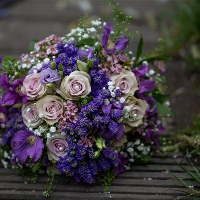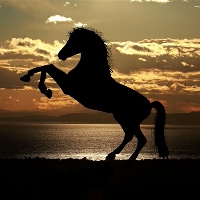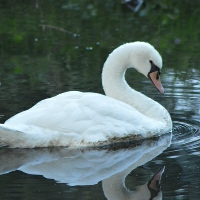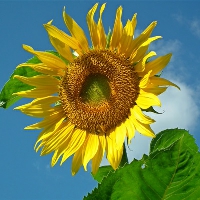The Young King 5
and avarice1 fled shrieking2 through the forest, and death leaped upon his red horse and galloped3 away, and his galloping4(飞驰) was faster than the wind.
and out of the slime at the bottom of the valley crept dragons and horrible things with scales, and the jackals(豺狼) came trotting5 along the sand, sniffing6 up the air with their nostrils7(鼻孔) .
and the young king wept, and said: 'who were these men and for what were they seeking?'
'for rubies8 for a king's crown,' answered one who stood behind him.
and the young king started, and, turning round, he saw a man habited as a pilgrim(朝圣者) and holding in his hand a mirror of silver.
and he grew pale, and said: 'for what king?'
and the pilgrim answered: 'look in this mirror, and thou shalt see him.'
and he looked in the mirror, and, seeing his own face, he gave a great cry and woke, and the bright sunlight was streaming into the room, and from the trees of the garden and pleasaunce the birds were singing.
and the chamberlain and the high officers of state came in and made obeisance10(敬礼,尊敬) to him, and the pages brought him the robe of tissued gold, and set the crown and the sceptre(权杖) before him.
and the young king looked at them, and they were beautiful. more beautiful were they than aught that he had ever seen. but he remembered his dreams, and he said to his lords: 'take these things away, for i will not wear them.'
and the courtiers were amazed, and some of them laughed, for they thought that he was jesting.
but he spake sternly to them again, and said: 'take these things away, and hide them from me. though it be the day of my coronation, i will not wear them. for on the loom11 of sorrow, and by the white hands of pain, has this my robe been woven. there is blood in the heart of the ruby12, and death in the heart of the pearl.' and he told them his three dreams.
and when the courtiers heard them they looked at each other and whispered, saying: 'surely he is mad; for what is a dream but a dream, and a vision but a vision? they are not real things that one should heed13 them. and what have we to do with the lives of those who toil14 for us? shall a man not eat bread till he has seen the sower, nor drink wine till he has talked with the vinedresser?'
and the chamberlain spake to the young king, and said, 'my lord, i pray thee set aside these black thoughts of thine, and put on this fair robe, and set this crown upon thy head. for how shall the people know that thou art a king, if thou hast not a king's raiment(衣服) ?'
and the young king looked at him. 'is it so, indeed?' he questioned. 'will they not know me for a king if i have not a king's raiment?'
'they will not know thee, my lord,' cried the chamberlain.
'i had thought that there had been men who were kinglike,' he answered, 'but it may be as thou sayest. and yet i will not wear this robe, nor will i be crowned with this crown, but even as i came to the palace so will i go forth15 from it.'
and he bade them all leave him, save one page whom he kept as his companion, a lad a year younger than himself. him he kept for his service, and when he had bathed himself in clear water, he opened a great painted chest, and from it he took the leathern tunic16 and rough sheepskin cloak that he had worn when he had watched on the hillside the shaggy goats of the goatherd. these he put on, and in his hand he took his rude shepherd's staff.
and the little page opened his big blue eyes in wonder, and said smiling to him, 'my lord, i see thy robe and thy sceptre(权杖) , but where is thy crown?'
and the young king plucked a spray of wild briar that was climbing over the balcony(阳台) , and bent17 it, and made a circlet(小圈,戒指) of it, and set it on his own head.
'this shall be my crown,' he answered.
and thus attired18 he passed out of his chamber9 into the great hall, where the nobles were waiting for him.
and the nobles made merry, and some of them cried out to him, 'my lord, the people wait for their king, and thou showest them a beggar,' and others were wroth and said, 'he brings shame upon our state, and is unworthy to be our master.' but he answered them not a word, but passed on, and went down the bright porphyry(斑岩) staircase, and out through the gates of bronze, and mounted upon his horse, and rode towards the cathedral, the little page running beside him.
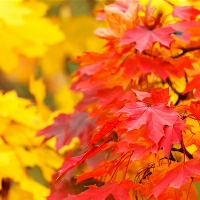 飘零的心 2024-04-16 15:59:12
飘零的心 2024-04-16 15:59:12

